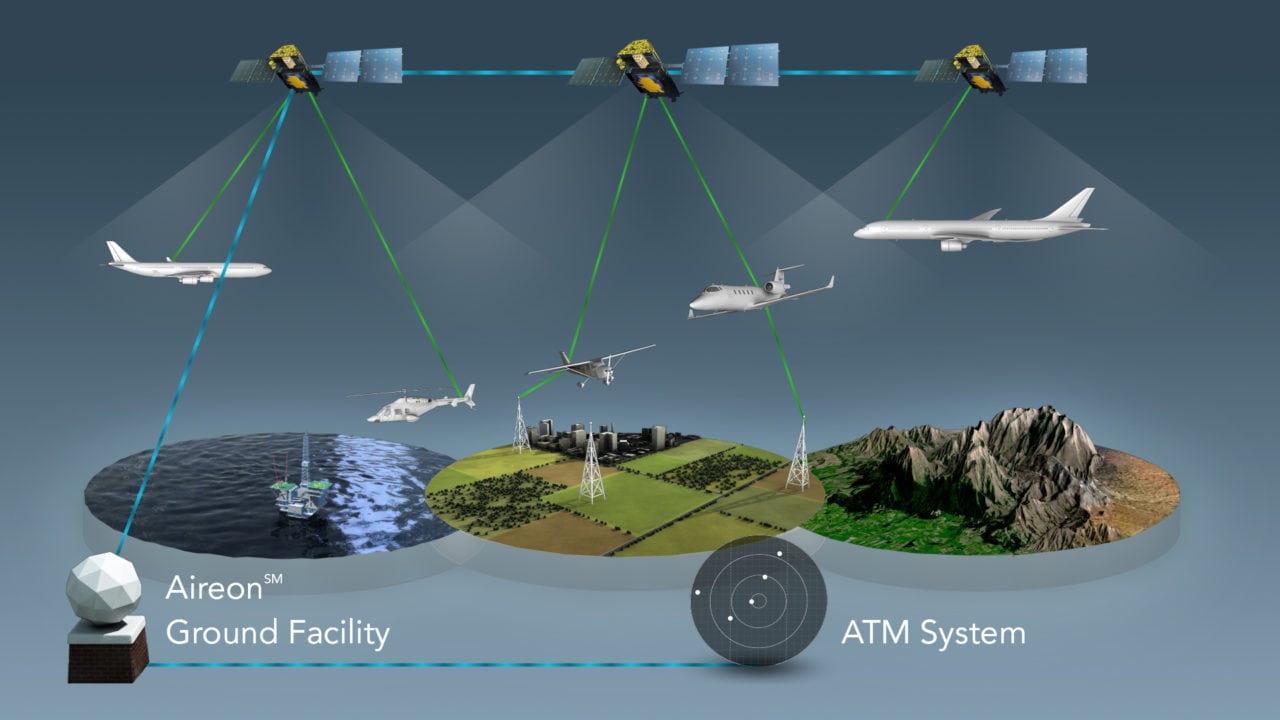
Diagram of Aireon’s Global Space-Based ADS-B. (Aireon)
The pre-registration period opened Wednesday for the Aireon ALERT program, a free service offered jointly by Aireon and the Irish Aviation Authority (IAA) aimed at helping to track aircraft in emergency situations.
By registering with Aireon ALERT, aviation stakeholders from airlines, regulators, air navigation service providers (ANSPs) and search-and-rescue organizations will be able to leverage Aireon’s deal with Iridium to provide space-based ADS-B in the event of an emergency. Relative to ADS-C, which provides a signal every 15 minutes, the every-eight-second signaling requirement of ADS-B can search area for a lost aircraft down from over 150,000 square kilometers to 12 or fewer. A lot of traffic gets tracked at one-second intervals, narrowing it down even farther.
Aireon’s primary endeavor is to use Iridium’s constellation of low-Earth-orbit satellites to have a network of space-based ADS-B monitoring that can cover the entire world, 24 hours a day, which they will use to provide a paid service to air traffic controllers (ATC) for constant aircraft monitoring.
CEO Don Thoma said, however, that the same “unique position that no one else is in that can see the world and the world’s aircraft” allows Aireon to offer this benefit to search-and-rescue efforts, which the company sees as a “duty.”
“Knowing that the whole world will not be our customer for ATC purposes, not everyone will have that data,” Thoma said. “We knew we had to address the issue, like an MH370 or events that happen all the time, where an aircraft gets lost, loses communications, has an accident, and we’ll have the data that could potentially help search and rescue find that aircraft.”
Aireon’s system tracks only 1090 MHz systems, because, Thoma said, the company “felt that the U.S. had 978 (MHz transponders) covered terrestrially, so we wanted to cover the rest of the world.” He also said that more and more units being bought and sold are dual-mode, allowing operators to broadcast across both frequencies. Within the 1090 frequency, all three versions of DO-260 (regular, A and B) are compatible.
In the event of an emergency, once the service is live next year, a qualified entity who has pre-registered would call the IAA, provide their identifying information and then it would take a matter for seconds for the last-known position of the aircraft in question to be looked up.
The company and the IAA are working on a method for verifying the identity of stakeholders who need the information to deal with emergency situations but haven’t registered for the service, because they recognize that will inevitably happen, but Thoma encourages everyone to register ahead of time to expedite the process and get the information into the hands of rescue crews as quickly as possible. He said there are already a good number of pre-registrations coming in.
Thoma said Aireon never gave serious consideration to trying to profit from this data.
“You don’t launch hundreds of millions of dollars of investments in space with the mind of trying to track the occasional plane that gets lost,” he said. “That’s certainly not a good business model. We looked at it pragmatically. Our main business model is providing real-time aircraft surveillance to air traffic control organizations.”
He went on to say that he felt it was a service that everyone in the company felt compelled to supply as members of the aviation community.
“We kind of had a responsibility to have a way to quickly get that data to other parts of the community that may not be customers but certainly are part of the system. It just seemed like the right thing to do. There were no objections at all from our investors or board. … Remember, our investors are navigation service providers, so they’re a part of that community.”
The 66th and final active ADS-B payload-equipped Iridium satellite will go up on a SpaceX Falcon 9 rocket sometime in the fourth quarter of this year. Following a period of maneuvering the satellite into place, and testing, the Aireon ALERT service will go live sometime in Q1 2019.
If you are an aviation stakeholder who wishes to pre-register for the Aireon ALERT service, go here.